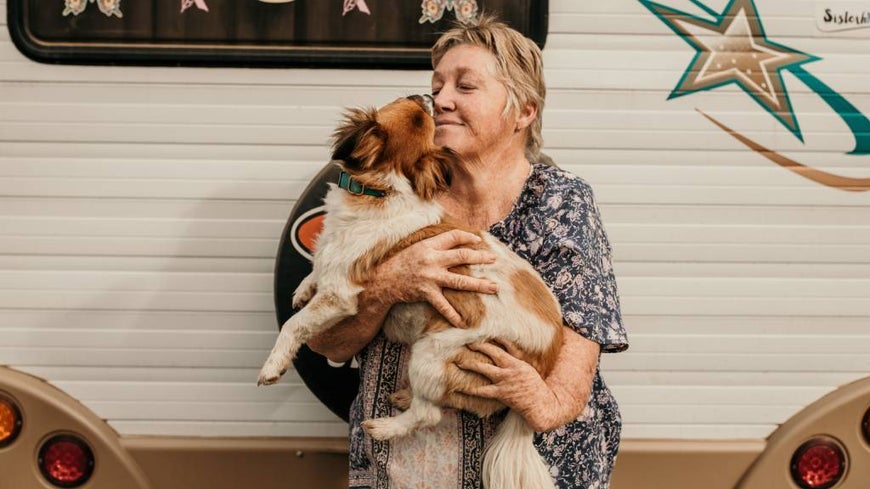Thalidomide survivor embraces the grey nomad lifestyle

Gaylene Seeney is a Thalidomide survivor, but it has not stopped her from adventuring around Australia with her terrier, Albert. Early on in her travels her first caravan was destroyed by a freak storm, but even that didn’t change her attitude to living the nomadic life and she’s now been on the road for more than four years.
She’s well equipped at getting off the grid – she’s got the water tank, solar panels and canned food at the ready. Gaylene appears in the Australian Seniors podcast series Life’s Booming, and here she talks about her life as a traveller on the road.
Gaylene tells her story:
I grew up on a little farm when I was young and I had a lot of freedom roaming the bush, so as an adult, I was yearning to get back to it. And the only way I could see to do that with my finances was to buy a home on wheels.
I tend to free camp 85-90% of the time because I dislike big crowds and like smaller gatherings. I would honestly prefer a one-on-one conversation to a group setting. Nine times out of 10, the people you meet on the road have their own story and they’re accepting that you’ve got your own story. Generally, people are really friendly - even communities that you go into in the bush - people are very welcoming. Australia’s a good place.
The Thalidomide drug caused widespread birth defects in Australian pregnancies
Due to Thalidomide, I was born with deformed upper limbs, so, to explain, if I put my arm up, my left arm is shortened, and my wrist is bent where your wrist would usually join your arm. This means that I don’t have the normal grip that people with thumbs have. So, a lot of the time when I’m on the road, I’m using a pair of pliers. This allows me to do tasks like opening the top of a bottle, or undoing the de-shackle on my chains on my caravan. I use the pliers to get enough grip.
I also have spinal deformities, one of which is a severe S-bend in my neck which can sometimes give me a lot of pain. But I have come to the realisation that I have to live with this body and I have to live with my challenges. As a child growing up I was bullied at school. In third grade we all had to fill in a copy book, and we had to learn how to write neatly. The teacher picked up my copy book and held it up in front of the whole class and said, “Look, Gaylene doesn’t have thumbs and she can do it better than all of you!” Once we went into the playground, all the kids were saying, “Oh, you’re just the teacher’s pet, blah blah blah.” So that follows me even now… it’s a little voice but I do forget I’ve got a disability.
I’ve had people look at me like I’m a freak and I’ve even had people hide from me, but that’s OK! I’ve had that all my life - it’s not something new that’s happening just because I’m travelling on my own. It’s also an empowering thing now because in my earlier life [people’s opinions] worried me, but they don’t anymore because I am doing what I want. I’m handling life with my disability, as best I can.

The best travel buddy
Albert my dog really hasn’t known anything but living in a caravan with me, so he’s a great travel buddy, he thinks he’s the best co-pilot in the world. He sits up in the centre of the single-cab ute beside me with his seatbelt on and it doesn’t take him too long, about 20 minutes and he’s bored, so he lays down and goes to sleep.
Help is something I have learned to accept
People are always trying to help, and do I want them to help? 99.9% of the time, I prefer that they don’t. I don’t mind if people offer, but I tell people not to be insulted when I say, “No, I don’t need your help at the moment, but if I do, I know where to come to ask.” And after four-and-a-half years I’m finally learning to ask for help.
I have broken some nails and taken some skin off myself trying to do things on my own. [Sometimes] there are other caravans around and I realise that I could have simply said, “Hey, listen mate, can you just help me do this, because I’m going to do myself an injury.” [Previously] I have not asked, whereas now, if someone offers help when I pull up in my caravan then I put my hand up now. I didn’t do that in the beginning, but it does make life a little bit easier when I ask for help.

Giving advice to others looking to hit the wide open Australian roads
I tell others, before you hit the road, don’t forget to bring forward your strength, your sense of adventure and your sense of humour, because you’ll need all three. Everybody that I’ve met out on the road has a story. Some share little bits, and I’m sure I don’t get anywhere near to the cream on the top of the milk. They’re all extraordinary. But if you want to do it, it doesn’t matter what you’re living with, you can do it.
13 Jan 2021